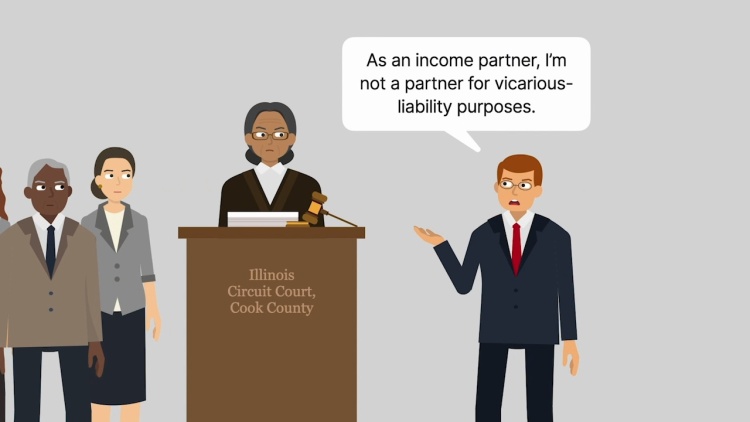Davis v. Loftus
Illinois Appellate Court
334 Ill.App.3d 761, 778 N.E.2d 1144 (2002)
- Written by Heather Whittemore, JD
Facts
Michael Loftus and Donald Engel (defendants) were partners in the law firm Gottleib & Schwartz. Loftus and Engel were accused of committing legal malpractice by Terry Davis (plaintiff). Under the Uniform Partnership Act, all the partners of Gottleib & Schwartz could have been held vicariously liable for the legal malpractice as well. Anthony Frink, an income partner at Gottleib & Schwartz, filed a motion to dismiss the legal-malpractice claims against himself. Frink argued that as an income partner, he was not a partner in Gottleib & Schwartz for purposes of vicarious liability. According to the Gottleib & Schwartz partnership agreement, income partners were paid a fixed salary plus a bonus but, unlike other partners, did not share in the partnership’s profits or losses. The $10,000 capital contributions that income partners made at the beginning of their tenure would be returned upon their withdrawal from Gottleib & Schwartz, without adjustment for the firm’s profits. The income partners also had no voting rights and were not allowed to serve on the executive committee that set the salaries for other employees, including the income partners. The trial court held that Frink and the other income partners were not partners within the meaning of the Uniform Partnership Act and granted Frink’s motion to dismiss.
Rule of Law
Issue
Holding and Reasoning (McNulty, J.)
What to do next…
Here's why 907,000 law students have relied on our case briefs:
- Written by law professors and practitioners, not other law students. 47,100 briefs, keyed to 996 casebooks. Top-notch customer support.
- The right amount of information, includes the facts, issues, rule of law, holding and reasoning, and any concurrences and dissents.
- Access in your classes, works on your mobile and tablet. Massive library of related video lessons and high quality multiple-choice questions.
- Easy to use, uniform format for every case brief. Written in plain English, not in legalese. Our briefs summarize and simplify; they don’t just repeat the court’s language.







